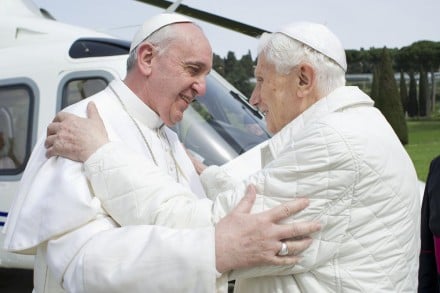An interesting tidbit from Rorate Caeli:
Following his recent visit ad limina with the bishops of his region, the Bishop of Molfetta (Apulia, Italy), Luigi Martella, spoke of the conversation they had with the new Pope, including the following:
Then, he spoke to us about Benedict XVI with such tenderness: “When I met him for the first time in Castelgandolfo, I noticed that he had a very lucid memory – he said – even though physically challenged. Now he is clearly better.” In the end, he wished to exhange a confidence, almost a revelation: Benedict XVI is finishing writing the encyclical on faith that will be signed by Pope Francis. Then, he will himself prepare his first encyclical on the poor: Beati pauperes! [Rorate note: ‘Blessed are the poor,’ he seems to be implying that could be the name of this encyclical letter.] Poverty – he made clear – understood not in an ideological and political sense, but in en evangelical sense.
William Oddie observes in the Catholic Herald:
Why couldn’t Pope Francis himself finish and then promulge this encyclical on faith? It is not generally realised that Pope Benedict’s own first encyclical, Deus Caritas Est, was actually started by his predecessor (so much for the general reaction that it made a wonderful change from the censorious John Paul). Francis, after all, is now the pope who will preside over the final phase of this year of faith. The teachings of the papal encyclicals are part of a continuing body of papal teaching. We have for the first time, two popes, living in close proximity in Vatican City. Why not another first: a joint encyclical? Pope Francis’s first encyclical could then be Pope Benedict’s last.
If Pope Francis, together with all those already involved in the composition of Pope Benedict’s encyclical on faith, were now to complete it, and possibly to issue it in the joint names of both Popes (though that isn’t essential) his predecessor will surely die happy to have left it incomplete. It would then have served as the perfect illustration of his most famous coinage and his most fundamental doctrinal principle: “the hermeneutic of continuity”.
















